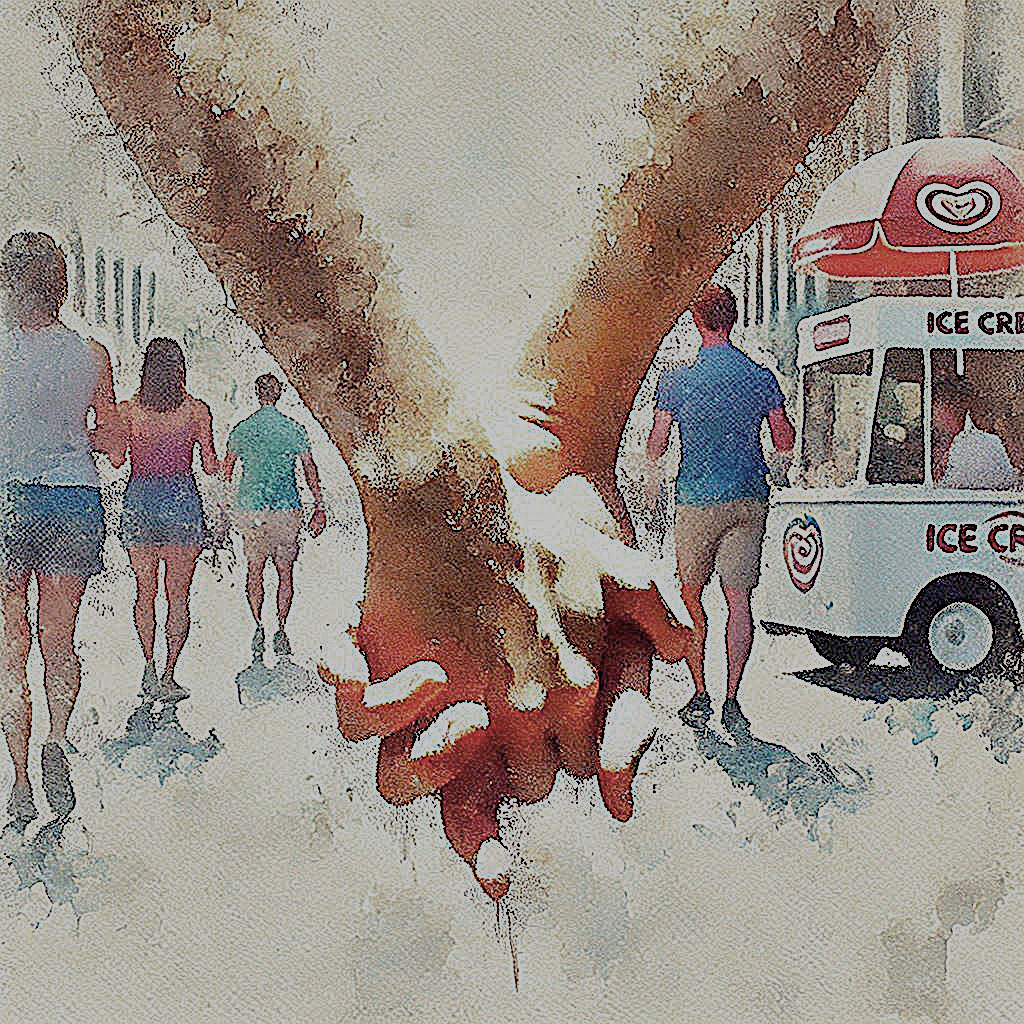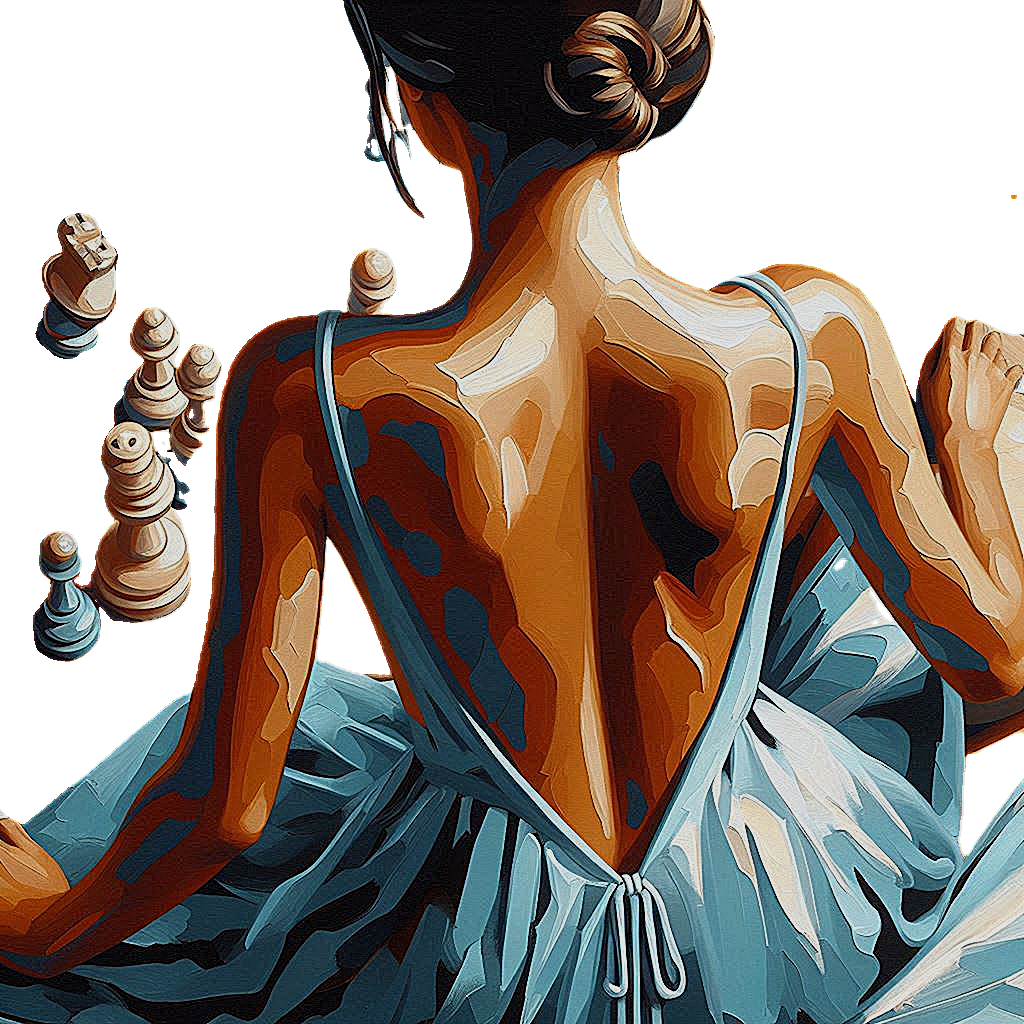
Price Tag
Content Warning: Sexual Abuse.
You are with the man who will rape you in an extravagant hotel room. I wish I could say something now and beseech you to run, but in the darkness of this night, I am you and you are me. I have many, many years before I walk free.
It is somewhere along a noisy street in Bombay. A smoky, dark space with black lights and incomprehensible visions of neon greens and laser beams splashed across the walls lodged into the depths of a grimy old building. You sit at a table set deep in the shadows. The bassline of the music thumps on the inside of your chest, and you wonder if it is indeed the music or the pounding of your poor heart for being submerged in such unprecedented unfamiliarity. A stench of cheap cigarettes, sweat, and old urine hangs over the customers like an invisible raincloud. In these forbidding shadows around your table, people behave and places smell unlike the wealthy, affluent plane of the city that you are currently suckling on, like a defenceless new-born – the swanky world of bright white lights and fresh flowers at reception desks, shiny shoes, and human darkness camouflaged with small talk and unintelligible legal jargon.
The floor is sticky. It whispers of spilled beer and vomit among a presumably wide array of other fluids. You worry for the soles of your shoes. They are new. Bowls of masala peanuts sit on every table – compliments of the chef. Faceless adolescent bodies writhe around wonky metal tables to overused Bollywood songs with smutty beats and smuttier lyrics. Copious amounts of cheap beer flow in and out of hastily rinsed out glass mugs all around. There is a birthday in the shadows across the two of you. Lavish candles on a cake light up screaming faces around it. A restless, springing group of seven, with sparkles and red lips, powdered faces and fledgling cleavage. Who do they think they are! The music gets even louder as the birthday girl blows out her candles.
“Cheap fucks,” he shouts into your ear, a little too close.
“Utterly classless,” you yell back into his and take in a whiff of his cologne. “Are you using Calvin Klein?”
“Using?” You catch theatrical indignation on the bear-like outline. “Absolutely not! I am wearing Tom Ford. Such a little villager!” An affectionate laugh.
You don’t know who he is, this mysterious Tom, but you say “Ah yes! of course!” as though a reference to a forgotten neighbour. “It was just terribly familiar…” You make a mental note to comb through the internet once the evening ends and you’re back in your single bed.
References to people and things that come only with social capital are perhaps your Achilles’ heel. Your background is not painted in money but you mostly have a way around it. You are attractive enough to never have to truly let it show – a poised straight back and full breasts; chic hair and plucked brows; perfectly painted lips and nails, all absorbed from years of scouring glazed magazines and the internet. With a great deal of effort mimicking pale skin and blue eyes behind TV screens, you learned to let English flit off your brown tongue like it would a White man’s. The Coloniser’s tongue, you had concluded, was the most expensive currency in your land. The brown could then be worn, ornamental and hidden under an unsuspecting, bleached façade. After that came rudimentary information on Hemmingway, Tolstoy or Tolkien; add to the mix, slivers of Floyd, The Beatles or The Doors, a few big brands and designers, and abracadabra! you had an audience. That was sufficient for a girl to survive on the other side.
You knew you were better than your home, your history. The rest of your family wasn’t up to your mark, you had assessed; what with your mother’s threadbare sarees and loud chewing, and your father’s dusty slippers and Malayalam cassettes. “It’s not pisa!!!” You had shrieked, visibly humiliated by your clueless mother during your first grand meal in Dominos at your insistence. “It is peet-za! God, you guys are such villagers!” Your parents watched you with pride even if at the steep cost of their dignity. “Peet-sa,” your parents repeated to each other. The boys were young, stupid and dirty all year round, they didn’t matter. But you, you had more to spare, you were the blessed one. That’s what you had read when your only friend in third standard had sniggered, when she saw you get off the school bus and walk into your home. A small whitewashed house down a stony lane flanked by coconut palms on both sides; where muddy water like well-made chai rose to your ankles during the merciless monsoon.
“I thought your house would be bigger than tha..at!” She had opined the next day, schooling you on the basics of shame, the unforgetting lass with thin hair barely covering her pale scalp, and dusky grey skin, that ugly little thing – the daughter of a nameless someone in Emirati oil fields. She didn’t know that your father’s boss had put you in the school; that your father wore a uniform in white and white to hold the wheel of a shiny black car, morning and night, neither with rest nor respite. The two of you sat on the same bench in an expensive school in the City by the Shore, clad in pinafores designed to cast a cloak of semblance, but failing miserably, one ironed pleat at a time. One seat was upholstered in moneyed nonchalance and the other, in sweat and aspiration with a fine thread of tears running through the body lending the fabric, unmatched character. The first time you learnt you were better than tha..at, you were eight.
“Oh no no!” You were quick to negate the classmate, with a laugh reeking of practice and performance. “We are painting our big bungalow in the next lane! It has eight fully air-conditioned bedrooms and ten bathrooms and my room is pink with tiled floors everywhere in black and white. Like a chessboard!”
There was one bathroom—always dim and always wet—for the five of you; you slept with your parents and two twin brothers on two double beds pushed together under a ceiling fan that didn’t twirl her skirt wide enough to shelter all of you. A brawl erupted every night to determine whose sleep would be sacrificed on the lumpy furrow where the two rickety beds merged into one; who’d be roused, should anyone stir or turn around, or if the men coughed or passed wind without apology or restraint. It was mostly you, for you were the eldest and yet, still a child – a flawed rationale you couldn’t surpass. On the rare occasion, when you were given the place by the window and your father would kindly offer to lay next to his wife, you witnessed lumpy silhouettes move like dark ocean waves under your mother’s blanket, through the flirty play of streetlight and shadow. You had been besotted by the tiles laid like a chessboard for the gods, in the ageless Padmabhapuram Palace during your school trip last year; so smitten that you forgot it had taken your father a month to cough up all of six hundred and fifty rupees for the trip.
“Like a chessboard! This is just for the time being, obviously!” On the other end of the bench, the expression changed and her ugly, piercing eyes settled. After having pitilessly ascertained your father’s price, she contracted to let you remain friends with her.
Gratitude, nonetheless.
“But why is all your hair falling out? I can see your head now…” Feigned curiosity, for you knew why; the girl had alopecia and it had been informed privately to each of the students, multiple times, so that she wouldn’t be pestered. Children can be unkind, they said and it is true, yet people forget: children bear the weighty cross of what they are taught and nothing new. You watched her ugly face crumple like a plastic sheet in a bonfire.
He likes your hair, he says, once the birthday clamour settles. But he prefers it longer, he adds after a deep mouthful of ice-cold beer. The picture of the woman on his WhatsApp picture flashes across your mind. She had long, straight hair all the way down to her slender waist. She was smiling. She looked happy to have his arms around her delicate frame. You want to ask him who she is. You don’t. Instead, you guzzle down your beer, all of it, not leaving a drop left in the mug that has evidently touched many a strange lip. A performance. “You chug beer like a guy,” many boys had clapped for you in the past. It used to make you feel like you were more than a girl, better than that. This time you get nothing. The world turns on its axis and you feel it in your bones. He refills your beers from the pitcher and promptly pulls your chair a little too close. The metal screeches against the black sticky floor. He snaps his fingers to call for more beer and casually puts his arm around you. It is heavy but you don’t move. Your hands are cold, your fingertips like blocks of ice. Your stomach churns. You smell the cigarettes on his breath.
“How many languages do you speak?”
“Just English, sadly!” He looks far from sad.
“Oh! What’s your mother tongue then?”
“It is supposed to be Gujarati but I don’t speak it. Hate the sound of it… so crass!”
“Oh!”
You know little more about him than a name and that he is colourblind. He caught your eye on your first day at the firm—a blue checked shirt wrapped around his large frame. You had walked in wearing black and white, and a gold Fossil watch worth Rs 8000 (you had pre-checked) purloined from an ex-roommate. He was leaning deep into his office chair, hands behind his head berating a junior without a shred of pity, in true law firm fashion, with the door of his cabin left wide open.
“Isn’t there one fucking thing that you can do right, you fucking moron?”
Your desk was right outside his cabin. You watched him with a corner of your eye through the day, while he worked and while he didn’t. You listened to his rich voice that told tales of the wealthy and the famous. He was certainly older, given the cabin and generous strands of grey. He had a marked ability to string words together in a fortunate accent without saying anything at all. He wore an aura around him at all times, a talisman of competence that made it arduous to keep up with his unfootnoted superiority.
Enough scouring on the internet gave you a few more pieces of that juggernaut puzzle—a South Bombay guy; went to a posh school where every student and teacher speaks like Robert Clive to this day; golfer; whisky connoisseur; both father and grandfather Bombay High Court senior counsels, aka, royalty. You felt a little tingle between your legs as you watched him type. The twinkle of his watch in the severe white lights. The exaggerated arch of his nose as he spoke on the phone. You saw the books lining the shelf behind him—law and literature without partiality or prejudice. You pulled out a worn out copy of Crime and Punishment out of your bag and placed it on your desk strategically. Though you had never read novels beyond 12th standard English, Dostoevsky had a mysterious way of scoring points among a certain breed. Fifty points to Wikipedia’s plot summary. You waited for him to stop on his way to the loo. Nothing. Perhaps on the way back? Nothing again. A few days went by and you upped your game after tracking the names on his sagging bookcase. You went back on Monday with a judicious bit of cleavage, thick kohl lined eyes and a second hand copy of The Golem and the Jinni worth fifty rupees.
He walked back from what you assumed to be a smoke break like a penguin waddling on ice. Eyes met. There’s nothing truer than eye contact. As he passed your desk he muttered with scorn, loud enough only for you to hear:
“Disgusting!”
The blood in your face receded; you buttoned up your white shirt. He was chuckling, you could see. Almost boyish. Eyes crinkled, his entire disposition stank of good fortune and backing. A platinum band on his left hand. He was striking and ugly all at once, you thought. He saw your confusion and mouthed:
“The book!”
He beckoned you into his cabin. You waited for no further cue; the button came undone once again.
Drinks after work? A message bubble on your phone one evening out of the blue.
I am not in office. I am at the airport. My father died this morning.
…
…
…
…
…
Sry to hear that. Ok, tell me when you get back
This morning you wear jeans to work because it’s a Friday. The dark blue pair which you had purchased with your first pay check a few months previously for 2800 Rupees—more than half your mother’s monthly salary. It fits you well and makes your backside look nice, you think. You are back in the city, after the two weeks bequeathed by the magnanimous corporate society, to grieve. Back at work, bearing the weighty vision of your father’s lifeless body covered in wilting flowers and pinches of vermillion; the image of his head limply shifting to one side, when they took the man and his dreams out of the little whitewashed house he built, and out of your lives, haunts your insides. His grey brows, his potato nose, his short fingernails. The way his face had smelled of formaldehyde and not the comfort of his clean, warm scent when you gave him the last kiss for this lifetime, something had shattered in your chest into a thousand irredeemable bits. His starched white uniform still hung on the back of the front door, long after curtain fall, an indubitable mark of eternal reverence.
Let’s get a beer after work, he texts from his plush cabin beyond glass that shone like royal mirrors, the mercy of a humble cleaner with hands as calloused as your mother’s. Over the two weeks that you were with family, he had been kind—a pleasant surprise. He had texted during the day, called you in the nights, speaking in cute whispers unbecoming of a grown man. You waited for your phone to buzz under the pillow while you lay on a lumpy cotton mattress near the puja room lined with all-knowing faces of gods and goddesses, as if in a trance, listening to your mother’s sobs waft out the bedroom. When he called, you felt surges of euphoria, a stamp of validation. Had you finally crossed over to the other side?
“You are special,” he said, and you felt like newly branded cattle. You found yourself trying to use bigger words, polishing the exterior of your speech, further, for it was all that you could reveal. You had little to say to him, but yet you tried. He said that he understood you, and I think he lied. He called you “different, unlike anyone he had ever seen.” You spent little time to determine what he in fact did mean. His relationship with his father was strained too, he said. Your relationship with your father wasn’t strained, it was dead but you didn’t contend.
He picks the place and says he’ll meet you there—a choice that contests the Patek Philippe on his chubby wrist. Yet you agree and pose no further questions. It’s my college hangout and no one will see us there, he quips. With him, you are running, panting, your legs fatigued, your lungs incapable of containing the last ounces of air whilst you sprint to the ephemeral finish line into the other side; whilst you peck at morsels of attention that he scatters from his pedestal, like specks of breadcrumbs for nameless birds. You are a nameless bird.
Someone opens the rickety door into the lone toilet and lets out a strong stench of sewage along with a flood of bright yellow light into the psychedelic madness that engulfs you. And for a moment you see his face, his eyes piercing into you. You look away. Drops of condensation trickle down the glass pitcher like morning tears—trusty and true.
In the next moment, you find his hand on your left breast. Not a caress, not an accident for it lingers without hesitation while his gaze remains on your face, firm and intent. Neither with respect, nor with kindness, a girl can tell. You slap it away—expectations from a virtuous woman. Innocence is on fire; virtue is dying. Darkness slithers into your eyes like a wily serpent. He laughs out loud; this is the wittiest you have appeared. It seems to amuse him far more than your beer chugging skills.
“You’re so cute,” he says. “I have often wondered if your bras are padded, you know?”
This time you laugh with feigned humour and civility. You drink some more beer. Your left breast tingles in pain. As the music grows louder and the beer in your mugs drain, you feel his thick hand back on your chest once again. You hit it away. He laughs again, louder this time, and it is now a game where only one of you can win.
“You are such a prude!” You want to leave.
“But you look nice.” You stay.
I forgive you.
The night grows darker. The server whose ombre silhouette suggests that he is no older than 14 leaves another bowl of masala peanuts on your table. You are losing at the slimy game at the table or maybe you aren’t even trying. Suck it up, you asked for it, you tell yourself. In the unsleeping city, you have nowhere to go. Your apartment with your own bathroom is a frightening place. It is where Grief comes to life with vicious teeth and nails. It is where you can narrate in one breath every unkind word you have said to your father until he died alone in his bed far away. It is where your brain picks out all the times you had shushed the phone when you saw ‘Achan’ flashing on the screen, the times you refrained from showing people pictures of your father, for he or his starched white uniform just didn’t “fit.” The dreadful phone call to tell you it was finally a moment too late for redemption…
You wrestle out of his grip in one swift motion and stagger into the toilet. Your head is spinning and you can feel your body beg for a release. You empty your gut, beer speckled with peanuts, into the crusty toilet bowl. Dizziness. It is time to go home. You wipe your mouth on your sleeve and undo the latch, only to find him right outside the door. You hold your breath and he smiles. He jostles into the tiny, stinking space and locks the door behind him. He is still smiling, his large, red nose spread across his big face. You want to scream but your body is cold. What if you are reading it all wrong? Is this rape, you wonder. But the floor is filthy and wet!
“I don’t want to do this,” you manage to say, but you sound like someone else—someone from the past, someone brown, someone true. The elegance has waned and he finds it funny once again.
“Aww sweetie, just relax.” He pushes you against the cold, soiled wall and shoves his tongue into your mouth with such force it makes you gag. You push him away from your cold body with whatever strength is left in you and say:
“I just threw up.” Part warning and part polite prayer. Part request and part apology…
“Come here, my little prude.”
He yanks you by your favourite pair of jeans using more force than necessary. You aren’t resisting. I forgive you. You hear the zip and one of the belt loops snap. Even through the discomfort of having a beast gnaw on your mouth, its tongue down your scared throat, its big fists either holding your neck in place or trespassing across unsuspecting pieces of your skin, you can only think of the pair of jeans that had given in. You are hurt yet you hold on to the last scraps of pride. You hold on while he does what he does without deliberate tears or complaint. When he lets go of your throat and you can breathe again, you straighten your shirt to conceal the damage he has made. Your lips are torn and they quiver in pain, the kohl around your eyes has streamed down in vain. You taste the metal of blood under your tongue. You avoid the grubby mirror, perhaps afraid of the spectre inside. Your mind lingers on the tattered reminder of your first pay check, a failproof testimony of the other side. You walk out of the cloud of bright yellow light with a smile no one sees, your muscles tight, your head held high. You watch him pay the bill, the price for a night. 750 Rupees and “keep the change.”
“Tonight was fun and we must do it again.” He hails you a cab and says goodnight. A gleaming black Mercedes waits for him and so does a grey haired man in a starched white uniform, head bowed in familiar reverence.
I wish I can tell you now that one day he will take you to an extravagant hotel room worth 14,000 Rupees; and there he will strip you naked—body and soul. But I cannot speak, for I am not born yet. Many years later, you will birth me out of your stitch-fixed soul—after faith and love and therapy. So, “of course!” you say and you shut the door.
I forgive you.
****
Suggested Reading
-
about Lollipop, Lollipop![Lollipop]()
Featured • Fiction • Nonfiction
Lollipop, Lollipop
The figure moved slowly, deliberately, its shrouded head turning towards Josh. Those eyes—sharp and frigid as icepicks—stared at him. The man’s black lips never moved, even as a word pierced him like a yell: “Beware.”
Featured • Fiction • Nonfiction
-
Featured • Fiction
-
Fiction



